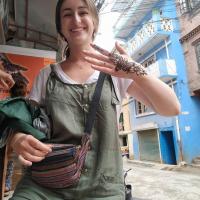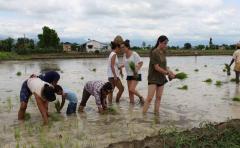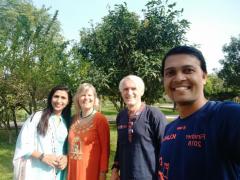Gap year volunteer program in Nepal
ReportLocation: kathmandu, Nepal
a) Teaching English at our Village Recourse CentersThe primary purpose of the Center is to offer community youth the
opportunity to develop their English language skills and to give the young
people a beneficial and positive way of spending their time rather than
taking up drinking, smoking, or gambling. PVN-Nepal's Resource Centers
offer English language instruction and cultural interaction to young
people and adults in the community. Ultimately, the philosophy is that
improved language skills will lead to employment, particularly in the
Chitwan and Pokhara tourist areas as well have enormous advantage in any
further education: English language is the medium for tertiary education
in Nepal. Being able to consolidate classroom knowledge with a native or
very good speaker of English is an enormous advantage in learning English
and learning about cultures is also enriching and important.
(B) Environmental Awareness
Volunteers will teach environmental awareness at the local school and/or
Environmental Post for 2 to 4 hours each day, Sunday through
Friday. Environmental awareness projects will be defined by the individual
volunteers based on their areas of expertise and the needs of the
village community. Example projects include: creating "green" clubs,
planting a flower garden, planting trees, garbage management, recycling
programs making a smokeless stove, building a toilet pit, etc. Volunteers
may also assist youth clubs or women's groups in the community
sharing their ideas, skills, and knowledge about environmental issues.
After completing the Nepali language and cultural training, volunteers
will be placed with a Nepali family in one of the program villages. The
the host family will live no more than one-half hour from the
school/Environmental Post PVN Nepal local coordinator will be helping to
volunteers...
(C)Cultural Exchange & Home-stay Program
Home-stays and cultural exchange programs can be arranged in most areas
of Nepal with our 30 host families. Participants will be placed with a
Nepali family in a small rural village for the duration of their stay.
This provides the volunteers with an excellent opportunity to learn about
all aspects of Nepali culture, lifestyle, language, food, and people.
Volunteers should remember that this is a cultural exchange and that an
effort to offer some knowledge of their own home culture and customs to
the family with whom they stay is appreciated. During their stay,
volunteers will attend 2 hours of language lessons in the morning and in
the afternoon. They will also have the opportunity to visit and help out
at the local school. Homestay programs are best organized from August
to December which is the time when most large local festivals take place.
This makes for an overall more exciting experience for the volunteer.
Nepali culture is distinctively friendly and open and participants are
made to feel as though they are part of the family. PVN Nepal local
The coordinator will be on hand to help volunteers.
(D )Health Post & Sanitation Issues
PVN Nepal's health post program provides a wide variety of experiences
depending on the time of year. While at your placement, volunteers may be
doing very hands-on work such as giving shots and treating wounds;
conducting home visits; developing and delivering information on health
issues such as birth control and personal hygiene; providing office
support; and providing knowledge transfer to the health post doctors on
the latest first aid techniques. Volunteers usually work approximately
two to four hours a day in the health post, supplemented by teaching
health education classes at a local government school or women's group.
Before your placement at the health post, volunteers will receive one
week of Nepali language and cultural training. During their placement,
volunteers will stay with a local Nepali family located within a
half-hour to an hour from the post. PVN Nepal's local coordinator will be
available to help volunteers.
(E )Teaching various subjects in Schools
In this program, volunteers teach various subjects of their choice at
government schools to students of varying ages and abilities, although most
students are aged ten to sixteen. Depending on the school, volunteers
will either teach independently or with another Nepali teacher.
Volunteers teach between two to four 45-minute classes each day, six days
a week (Saturdays are holidays). Volunteers enrolling in this program will
also be expected to share their own teaching methodologies/experiences as
well helping the school's teachers develop their own conversational
English skills. Before their placement, volunteers will receive two
weeks of Nepali language and cultural training. During their placement,
volunteers will stay with a local Nepali family located between a
half-hour to one hour from the school. An PVN Nepal local co-ordinator
will be available to help volunteers. This will be one of the most
fulfilling experiences of your life.
(F) Volunteering at Orphanage
Volunteers will be placed in an orphanage where they will live with the
children, or with our host family, assisting them in their day-to-day
routine. The children are mostly between the ages of four and fifteen and
have a basic understanding of English. The general role of the volunteer
will be to act as an older sibling: to care for, look after, and encourage
the children. Volunteers will teach the children general life skills,
including health and sanitation, as well as arts, crafts, and music.
Depending on your skills and interests, though, you can also teach
songs, music, dance, cooking, or any number of activities, and generally
just spend quality time with the children.
WORKING ARRANGEMENT
We do not ask for any formal qualifications from our volunteers. All we
ask is that you have a genuine desire to help people and be willing to
experience new cultures and lifestyles.
LIVING ARRANGEMENT
YOUR DAY AT THE PLACEMENT||
In a typical placement, volunteers stay with a family where they eat Nepali
food with the family twice a day (around 9 a.m. and 7
o'clock in the evening). Tea is served in the morning and the
afternoon. Volunteers may have the opportunity to get together with other
volunteers and share their experiences. You will be able to travel to
nearby towns to purchase things for daily use and could travel to other
areas on longer vacations. Besides your project work, volunteers can
utilize their spare time in organizing the youth and women's groups of the
community to do some worthwhile activities like building a smokeless
stove, or toilet by using local materials, making a soak pit, kitchen
gardening, making a solar dryer, garbage management or paper recycling.


